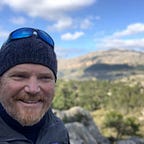“Market Driven Regeneration”
Daniel Wahl in conversation with Alex Pryor
On September 10th, 2020, I had a great conversation with Alex Pryor who I was introduced to after my book launch tour in Brazil (2019). He and his wife have since visited Mallorca and we have become friends. When I recently watched a 2013 TEDx talk by Alex in Spanish I was struck how he was speaking about so many of the core messages — as I would see it — that I included in ‘Designing Regenerative Cultures’.
There is great alignment between my own work and his dynamic, systemic, flow thinking and the intuitive, heart-felt knowing he uses to guide his rational and systemic analysis of how a business can be of service to people and planet.
We talked about how Alex sees his whole life and success story as “being driven by passion and gut feeling” and the “rational came afterwards.” It was not planned but simply flowing through him. Alex grew up in Argentina, with his dad as an agronomist taking him to visit many different farms and also making him aware of the agricultural frontiers encroaching on the native forest areas. Maybe this had something to do with setting up a company with the primary purpose of social and ecological regeneration?
Alex has a deep connection to the yerba mate culture of the Guarani people with their deep ritual of the sacred fire heating the water (female) to be poured into the gourd (male) combining both with the sacred plant — drinking together while sharing dreams in the morning and having the local shaman weave them into the collective dream to decide what needed to be done that day. To then come together at the end of the day to share again.
We speak about the Guarani’s surprise with Western concepts like material ownership or land ownership and their practice of letting go of material possessions regularly. Alex tells the mythology behind the hierba mate. And how being free of belongings and not even believing that one’s life is one’s own meant that their world was one “free of time” — of not being trapped in a linear conception of time. Constant contact with ancestors is part of that culture.
We speak about ‘coming home to place’ and shifting from feeling that we need to do things to increase control of our lives rather than paying attention to ‘being’ and the responsiveness to what life’s flow offers anew in every moment.
I asked Alex about how he came set up Guayaki with college friend David Karr while he was studying Food Science in California. David was the first to see the potential of the visionary new business model of ‘market driven regeneration’. Guayaki set up in 1996 on the business model of ‘market driven conservation’ then changed to ‘market driven restoration’ and now ‘market driven regeneration’ — the impulse has been regenerative from the start and worked in a place-sourced synergistic way from the start.
The initial bold vision(set for 2020) to protect and restore 200.000 acres of Atlantic Rainforest while providing at least 1000 families with the means to live in and protect their native forests has been not just achieved but surpassed. Over 2000 families protect their forest growing mate in its shade.
“This is what we continue doing. Strengthening the identities of every relationship that we build. … The most important focus is in the relationship that we build in everything, between human beings, and that get’s extended to all living beings. To flora and fauna, and the air and the rain water. From there we can build these communities that can thrive and come to life. That’s why we say ‘Come to life!’ or ‘Salud a la vida!’ We look for bright spots where life wants to come to life. Whether in the forest near national parks or in communities in the United States wanting to be part of a different story.”
— Alex Pryor
We also talked about John Elkington’s “Green Swans” and how Guayaki as a company fits that vision of exponentially positive impact. Guayaki works with communities, national parks, NGOs recognising the need for cross-sector alliances to enable systemic regeneration.
Other topics we touch on:
— Land Conservancies ( the Masi Mara, Kenya example)
— stewardship (cross-sector partnerships)
— the importance of collaboration
— Guayaki’s recent partnership with Gaia Amazons as a way of paying forward for the rain the Atlantic Rainforest receives from moisture generated in the Amazon … a project that supports the indigenous people in Amazonia to retain sovereignty of their land and ways if living
— “listening to our internal call/voice to inform our vision and mission”
— the spirit of the Mate plant and what it teaches
— “not looking for destiny, but allowing destiny to come to you”
— sky-rivers, trees, biotic pumps, fertilisation of the Amazon by the Sahara — the work of Martin von Hildebrand (helping to protect 25 million hectares of Colombian Amazonia)
— ‘market driven regeneration’ as a learning path which is leading to rewinding and healing ecosystem
— the Tompkins Foundation
— Phinda Reserve, South Africa, as a model for regeneration
— the potential of human beings — … (more)
Here is the recording of our conversation:
—
If you like the post, please clap AND remember that you can clap up to 50 times if you like it a lot ;-)!
Daniel Christian Wahl — Catalyzing transformative innovation in the face of converging crises, advising on regenerative whole systems design, regenerative leadership, and education for regenerative development and bioregional regeneration.
Author of the internationally acclaimed book Designing Regenerative Cultures
Please consider supporting my ongoing work by becoming a patron:
